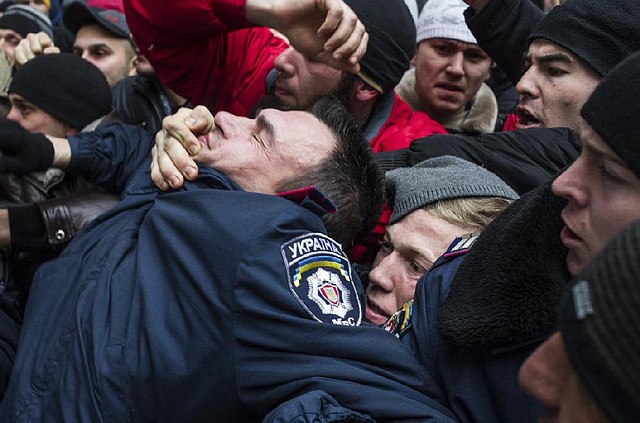Ukrainians pitch next premier
Protesters back lawmaker; Russia drills troops near border
Crimean Tatars overwhelm a police officer Wednesday in Simferopol in Crimea as about 20,000 Muslim Tatar supporters of the interim Ukraine government clashed with a smaller group of pro-Russian ralliers.
Thursday, February 27, 2014
KIEV, Ukraine - Leaders of Ukraine’s protest movement on Wednesday proposed a top legislator as the country’s next prime minister, while Russian President Vladimir Putin ordered major military exercises just across the border.
The new government, which is expected to be formally approved by parliament today, will face the complicated task of restoring stability in a country that is deeply divided politically and on the verge of financial collapse. The country’s pro-Russian president, Viktor Yanukovych, fled the capital over the weekend.
At Kiev’s Independence Square, the heart of the protest movement against Yanukovych, the interim leaders who seized control after he fled proposed Arseniy Yatsenyuk as the country’s prime minister.
Yatsenyuk, 39, is a millionaire former banker who served as economy minister, foreign minister and parliamentary speaker before Yanukovych took office in 2010.
One of the first jobs for Yatsenyuk and other members of his new Cabinet will be seeking outside financial help from the European Union and the International Monetary Fund.
Economists have said Ukraine is close to financial collapse. The acting finance minister has said Ukraine will need $35 billion in bailout loans to get through the next two years.
Any such deal will require a new prime minister to take unpopular steps, such as raising the price of gas to consumers. The state gas company charges as little as one fifth of what it pays for imported Russian gas. The IMF unsuccessfully pressed Ukraine to halt the practice under two earlier bailouts, and halted aid when Kiev wouldn’t comply.
The European Commission’s top officials held a meeting Wednesday in Brussels to discuss how the 28-nation bloc can provide rapid financial assistance to Ukraine.
In Moscow, Putin ordered military exercises to test the readiness of units in central and western Russia, Defense Minister Sergei Shoigu said in a televised statement. The exercise would “check the troops’ readiness for action in crisis situations that threaten the nation’s military security,” he said.
Russia’s military put scores of units on alert for an exercise that is scheduled to last until Monday, Defense Minister Sergei Shoigu said.
Russia denied the maneuvers had any connection to the situation in Ukraine.
While Russia has pledged not to intervene in Ukraine’s domestic affairs, it has issued a flurry of statements voicing concern about the situation of Russian speakers in Crimea, which hosts a major Russian naval base and where the majority of the population is Russian-speaking.
In Crimea, historically a part of Russian territory until the Soviet Union ceded it to the Soviet Socialist Republic of Ukraine in 1954, ethnic Russians have appealed for the Kremlin’s intervention to protect the region and its population from Ukraine’s opposition leaders.
In the Crimean regional capital of Simferopol on Wednesday, about 20,000 Muslim Tatars rallied in support of Ukraine’s interim leaders outside the regional parliament, where they clashed with a smaller pro-Russian rally. One health official said at least 20 people were injured, while the local health ministry said one person died from an apparent heart attack.
Igor Korotchenko, a former colonel of the Russian military’s General Staff, wrote a commentary in a Russian online newspaper, slon.ru, saying “if illegal armed formations attempt to overthrow the local government in Crimea by force, a civil war will start and Russia couldn’t ignore it.”
Secretary of State John Kerry said Wednesday that Russia should be “very careful” in how it proceeds in Ukraine.
“We are not looking for confrontation, but we are making it clear that every country should respect the territorial integrity, the sovereignty of Ukraine,” Kerry said.
He also renewed demands that Moscow withdraw troops from disputed enclaves in another former Soviet republic, Georgia. The U.S. also urged Georgia to further integrate with Europe and NATO.
He announced unspecified U.S. assistance “to help support Georgia’s European and Euro-Atlantic vision.” And, he denounced Russia’s continued military presence in the breakaway Georgian territories of Abkhazia and South Ossetia in violation of the cease-fire that ended the 2008 Russia-Georgia conflict.
Kerry insisted that U.S. policy toward Ukraine, Georgia and the other states that once made up the Soviet Union is not aimed at reducing Russia’s influence in its neighborhood. Encouragement to integrate with the West is driven by America’s desire to see them succeed as robust democracies with strong economies, he said. Information for this article was contributed by Karl Ritter, Vladimir Isachenkov, Maria Danilova, David McHugh, Svetlana Fedas, Yuras Karmanau and Matthew Lee of The Associated Press and by Steven Lee Myers of The New York Times.
Front Section, Pages 5 on 02/27/2014

